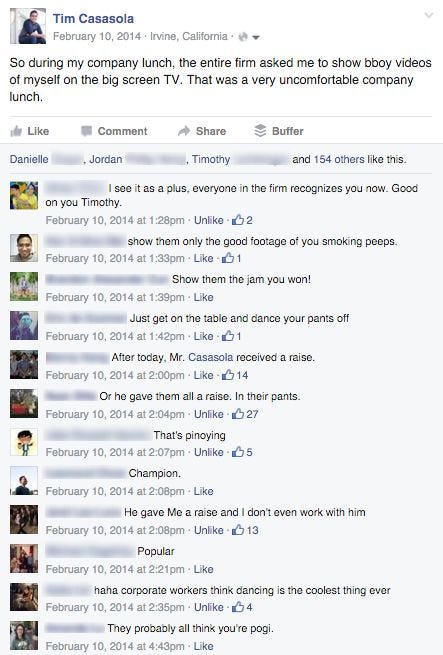Why “Being Professional” Holds You Back

I was known as the “breakdance guy” at work. And I hated it.
“Whoa, you’re a breakdancer?!”
At every job interview I’ve ever had, I’m always asked this question. Every. Damn. Time. It’s all the recruiter wants to talk about after noticing I was part of a breakdance club in college (on the bottom of my resume).
Never mind my professional experience. Forget the hours spent tailoring my resume and preparing my interview answers. And ignore the “career advice” I’ve been given about how employers don’t give two shits about anything outside of your professional experience.
The first time I attended a company-wide lunch in one of my previous jobs, I was ready to give my new colleagues a fantastic professional impression. That is, until my boss called out, “Tim! The founder really likes hip hop dancing. Show us a YouTube video of you dancing!” So much for a professional first impression…

Facebook commentary aside, in retrospect, I realize I was struggling with a bigger issue. Why am I so uncomfortable sharing one of my life’s passions with others? Why do I feel this need to exude an “always-professional” persona when I know I’m much, much more than that?
The Costs of Faking Your Personality
We all have felt uncomfortable revealing certain parts of ourselves. It’s human nature to shape our behavior to conform to a situation, or new culture. Sometimes we need to act more extraverted than we are (such as at a huge conference or a meeting with a potential investor). But here’s the thing:
At work (and beyond), it’s unhealthy for us to fake our personality.
Research has shown that doing this can leave us less satisfied and more stressed out at our jobs. And beyond our psychological well-being, faking our personalities can lead to poorer mental and physical health. Cambridge University professor Brian Little suggests that when we fake introversion or extraversion (and we’re authentically the opposite), our autonomic nervous system and immune system takes a hit too.
Faking Conscientiousness

Conscientiousness is the personality trait of being thorough, careful, and vigilant. If you’re conscientious, you’ll succeed at your job (and decades of research show this). However, Balsari-Palsule believes that we go as far as faking our conscientiousness at work—putting on an act of working “longer than necessary” to prove that we’re hard-working, dedicated, and diligent enough. Just like faking any other personality trait, faking conscientiousness leaves us more stressed and less satisfied at work.
But our knowledge work is moving away from the traditional 9–5; we’re seeing organizations such as Basecamp and Treehouse shaving their workweek to 32hours. And unlimited vacation and work-from-anywhere policies are more prevalent. So do we really need to be concerned about people faking conscientiousness at work?
In another study, Boston University Professor Erin Reid studied individuals in an elite global consulting firm. She compared the performance reviews of a) those who worked an average 40-hour week, b) those actually worked an 80-hour week, and c) those who faked an 80-hour week. Those who worked 40 hours a week had the lowest performance review scores.
But the catch? Those who faked an 80-hour workweek scored the same on their performance reviews as those who actually worked 80 hours.
Our organizations are rewarding fake conscientiousness, and we’re long overdue to face the facts. So what can we do?
Encouraging Wholeness
Frédéric Laloux in Reinventing Organizationsintroduces the concept of wholeness:
“Every time we leave a part of us behind, we cut ourselves off from part of our potential, of our creative and energy. No wonder many workplaces feel somehow lifeless. In wholeness we are life-full… Work becomes a vehicle where we help each other reveal our inner greatness and manifest our calling.”
We should be able to be our whole selves at work, because work allows us to reach our potential and find meaning in life. This should be a no brainer, but our organizations today are actively and systematically preventing us from being ourselves. And this only hurts the org, as Laloux puts it:
“…Our community will be richest if we let all members contribute in their distinctive way, appreciating the differences in roles, education, backgrounds, interests, skills, characters, points of view, and so on.”
We must encourage wholeness at work. And this goes beyond the annual holiday parties, the happy hour outings, and the ping pong tables.
For teams and organizations, start by cultivating psychological safety: the feeling that you can speak your mind and experiment with ideas without being judged. In meetings, invite anyone to share how they’re currently feeling if they’re willing to. Encourage taking breaks and personal time, and make sure your leaders exemplify this. And if your team is serious about stepping up to wholeness, consider learning more about what types of self-organized models work for you.
For people, let’s be just that, people. Vocalize your true opinions, and fully listen to your colleagues when they do too. Keep track of what you accomplish and what you ship, not how many hours you spent in the office. Introverts, make space for me-time, and extraverts, make time for others. If your colleagues ask about your hobbies, don’t be afraid to geek out with them.
Because it turns out it’s surprisingly fun to be the breakdancer at work. If you’re not worried about everyone accepting you for you.
